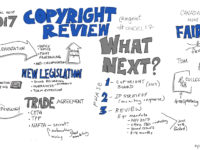In December 2017, the government launched its copyright review with a Parliamentary motion to send the review to the Standing Committee on Industry, Science and Technology. After months of study and hundreds of witnesses and briefs, the committee released the authoritative review with 36 recommendations that include expanding fair dealing, a rejection of a site blocking system, and a rejection of proposals to exclude education from fair dealing where a licence is otherwise available. The report represents a near-total repudiation of the one-sided Canadian Heritage report that was tasked with studying remuneration models to assist the actual copyright review. While virtually all stakeholders will find aspects they agree or disagree with, that is the hallmark of a more balanced approach to copyright reform.
Post Tagged with: "digital locks"
The LawBytes Podcast, Episode 4: Going Inside Canada’s Copyright Review
The House of Commons Standing Committee on Industry, Science and Technology has spent the past year reviewing the state of Canadian copyright law. The review, which is scheduled to result in a report with recommendations for potential reforms, featured hundreds of witnesses representing a wide range of views. To introduce some of the issues and provide some insight into how the review process functions, this week’s LawBytes podcast relies on the audio recording of my committee appearance in December 2018. It opens with my seven minute opening statement and continues with several exchanges with MPs on issues such as fair use, the USMCA, crown copyright, and anti-circumvention rules, which are often referred to as digital locks.
How Canadian Copyright Reform Could Support the Government’s Supercluster Investment
The release of Budget 2019 yesterday again placed the government’s innovation strategy in the spotlight as the government emphasized its significant spending record, including $950 million for the superclusters, $4 billion for science research, $795 million in 31 strategic innovation fund agreements and $2.3 billion for clean technology support. The investments were highlighted in a recently released an innovation scorecard, Building a Nation of Innovators, which takes stock of the government’s efforts over the past three years. My new CIGI policy brief argues that while the benefits from this spending will take years to realize, increased investments in strategic sectors are the easy part of innovation policy.
The State of Canadian Copyright: My Copyright Review Appearance Before the Industry Committee
With the Industry committee’s copyright review winding down, I appeared yesterday before the committee to discuss the state of Canadian copyright. The wide ranging two hour discussion focused on everything from fair dealing to crown copyright to concerns that publishers don’t fairly compensate authors for their digital licensing revenues. My opening statement placed the spotlight on five issues: educational copying, site blocking, the so-called value gap, the impact of the copyright provisions of the CUSMA, and potential reforms in support of Canada’s innovation strategy. An audio version and transcript of the opening statement is posted below.
The Fight for Fair Copyright Returns: Canadian Government Launches Major Copyright Review
The Canadian government kicked off its review of the Copyright Act this afternoon with a motion to ask the Standing Committee on Industry, Science and Technology to conduct a study on the issue. The formal launch had been expected for months since the 2012 reforms included a mandatory review of the law every five years. Lobby groups have been steadily gearing up for the review, with some hoping to undo some of the balancing provisions of the last reform process or demanding new restrictions. Indeed, restrictions on fair dealing, takedown rules, website blocking, and copyright term extension will undoubtedly figure prominently in the lobby playbook. Yet for millions of Canadians, the copyright review offers an opportunity to ensure that the law meets the needs of education, innovation, consumer rights, and creators with more flexibility in the form of fair use and restoring neutrality on Canada’s restrictive digital lock rules.











